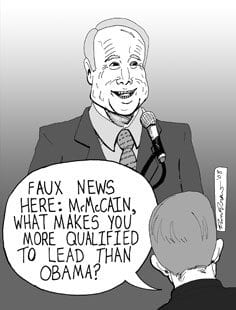
Obviously ready
|
|
“… my years of public service in Washington …” |
Pundits and politicians continue to ask voters whether Barack Obama is ready to lead. That was a fair question at the beginning of his campaign for the Democratic presidential nomination. The president of the United States is the nation’s chief executive officer. It is appropriate to question each candidate’s qualifications.
In these complex times, an effective president must be well-educated, intelligent, even-tempered and analytical; have good judgment and administrative skills; and possess both a new vision for the nation and the energy to lead. Under ideal circumstances, the president must also be charismatic so that others are inspired to follow his lead.
When Obama announced his candidacy in February 2007, he was an unknown in presidential politics. Everyone conceded that he was highly intelligent and well-educated: He is a graduate of Columbia University and Harvard Law School where he was the first African American to be president of the prestigious Harvard Law Review. But his other qualifications would be revealed in the course of the campaign.
The other candidates included Sens. Hillary Clinton, Joseph Biden and Christopher Dodd, former senators John Edwards and Mike Gravel, Congressman Dennis Kucinich and Gov. Bill Richardson. Obama had been elected to the U.S. Senate from Illinois for the first time in 2004. His resume had the least amount of government involvement at the federal level of any of the presidential candidates. Predictions were that the Obama campaign would be short-lived.
Undaunted by the pessimists, Obama developed a strategy for victory, raising funds at historic levels. On Jan. 3, 2008, he shocked the political world when he won the Iowa caucus. Then, on Jan. 8, he nearly won in New Hampshire, and still acquired as many delegates as the victor, Hillary Clinton.
The real test was to come on Super Tuesday, Feb. 5, when 24 states would hold primaries or caucuses. It was generally believed that the Clinton strategy was to win overwhelmingly on Super Tuesday and become the presumptive Democratic candidate. However, Obama won a majority of the states. He said to his supporters, “What began as a whisper has now swelled to a chorus that cannot be ignored.”
Do not underestimate the strategic skill necessary to organize and manage a campaign to become the Democratic candidate for president. Success has required great administrative skill and the ability to formulate a vision for America that would motivate and mobilize the electorate. Obama has done that.
Part of being presidential is to confront conflicts with equanimity. A leader with an unemotional approach generates a sense of confidence in the people that dangerous situations will reach satisfactory resolution. Obama has already demonstrated coolness under fire. In fact, critics have complained that he is so cool that he seems to be detached.
Obama has also demonstrated sound judgment. He opposed going to war in Iraq, an opinion that almost everyone now concedes is correct. He advocates the withdrawal of U.S. troops in 18 months after he takes office, a plan now endorsed by Iraq’s prime minister, Nouri al-Maliki. Obama has supported precision strikes against al-Qaida targets in Pakistan, a position that his political opponents at first opposed but now accept. And he called for the initiation of diplomacy with Iran, which the Bush administration has just begun.
These political positions indicate both that Obama has sound judgment and that he will be an effective commander in chief. In addition, the warm reception he recently received in Europe and the Middle East indicates that he has the charisma to repair America’s damaged international relationships, which is necessary for a united front against terrorism.
The evidence is substantial. There can be no doubt that Obama is ready to lead. Those who still raise the question are using the issue to cover unsavory and less acceptable points of view.






